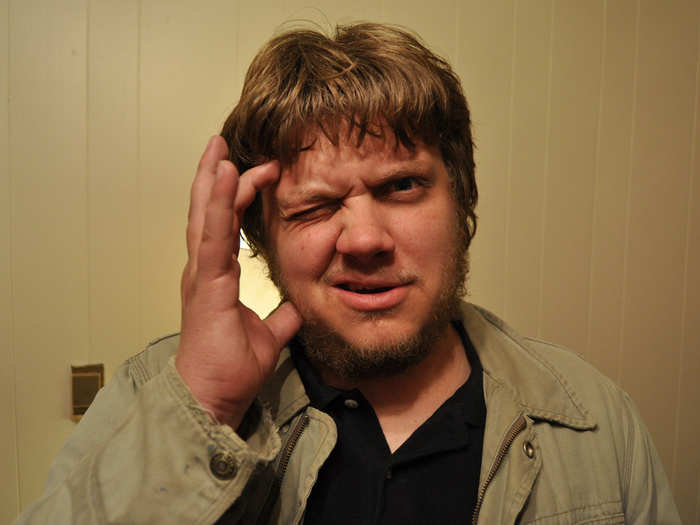10 bizarre brain disorders that completely change how people see the world
Cotard's Syndrome: This disorder makes people think that they're dead.

Prosopagnosia: Some people can't remember others' faces.

The writer and neurologist Oliver Sacks recounts the story of a man who "mistook his wife for a hat." He suffered from a condition where he couldn't recognize faces, known as prosopagnosia, or face blindness. (Sacks himself has a moderate version of the condition.)
Depending on how severe the case, a person may have a hard time recognizing just familiar faces, telling strangers' faces apart, or even telling a face apart from an object. Some people with prosopagnosia can't even recognize their own face. The condition is usually caused by stroke, but as much as 2.5% of people may be born with it.
Mirror-Touch Synesthesia: This disorder makes people feel what other people are feeling.

On an episodes of the NPR show, Invisibilia, a woman who wished to remain anonymous reported that when she sees people being hugged, she feels like she's getting a hug herself. When she sees someone get hurt, she feels pain in the same place as they do. And she can't watch people eat, because she feels like they're shoving food in her mouth.
Amanda suffers from a rare condition called mirror-touch synesthesia that makes her able to physically "feel" what others around her are feeling. Although she was born this way, other people have acquired the ability after having a stroke, or a limb amputated (which can lead to sensations in a "phantom" limb). The first case of this condition was reported in 2005, and there have only been a handful of other reports since then.
Capgras Delusion: People with this condition think a loved one has been replaced by an imposter.

After giving birth, a 36-year-old woman developed the delusion that her son and other family members had been replaced by imposters. The delusion persisted for five years, and every treatment doctors tried failed. Finally, the woman was given electroconvulsive therapy (in which electrical shocks are passed through the brain to induce a seizure), and her psychiatric symptoms subsided.
The woman suffered from what is known as the Capgras delusion or Capgras syndrome, where you think loved ones have been substituted by imposters, robots or aliens. It usually occurs in patients with paranoid schizophrenia, but has also been seen in patients with a brain injury or dementia. It's also more common in women than men (by a ratio of 3:2).
Alien Hand Syndrome: Some people are convinced their hand doesn't belong to them.

An 82-year-old woman suffered a stroke, and upon recovering about six weeks later, she reported that her left arm did not belong to her. Instead, she was convinced the limb belonged to her brother, who had been with her when she experienced the stroke. She felt as if the arm would not do what she wanted it to do.
This was a case of alien hand syndrome, a rare neurological disorder where a person's limb moves without their control, making them feel it does not belong to them. Sometimes, the patient may reach for objects with the alien hand, and use their healthy hand to restrain it. The condition may be caused when the connections between the brain's two hemispheres are severed, but can also happen after a stroke or other brain injury. Only about four dozen cases of alien hand syndrome have been reported.
Hemispatial Neglect: This condition makes half of your world invisible.

After a stroke, some people may start to ignore half of their world, according to some accounts. For example, one of these patients may neglect to eat half the food on her plate, despite still being hungry. Or she may draw a clockface showing only the numbers 12 to 6.
The woman suffered from a condition known as hemispatial neglect, which happens when damage to one brain hemisphere causes a person to lose awareness of one side of the space around them. The person can no longer see or process information received from that side of the body or environment (often the side opposite the brain injury).
Aphantasia: People with this condition can't picture things in their minds.

A 65-year-old man called MX suddenly lost the ability to summon up images of things in his mind after a coronary angioplasty surgery. On questionnaires, he reported not being able to visualize any images, despite the fact that he performed normally on standard tests of perception, visual imagery and visual memory.
After researchers reported this, more than 20 other people contacted them to say they had the same inability to picture things in their mind's eye. Though not yet a recognized neurological condition, scientists have eloquently dubbed the phenomenon "aphantasia," from the Greek word for imagination.
Jerusalem Syndrome: Some people develop religious delusions when they visit the holy city.

A healthy German man came to Jerusalem to study Judaism, in search of the one "true" religion. But he ended up having a psychotic episode in the Church of the Holy Sepulchre, a church built on the site where Jesus is thought to have been crucified and buried.
According to researchers, this man may have suffered from "Jerusalem syndrome," a phenomenon in which visitors to the holy city develop religious delusions and psychotic ideas. Israeli psychiatrists reported in 2000 that 1,200 tourists had been admitted to the city's Kfar Shaul Mental Health Center with "severe, Jerusalem-generated mental problems" between 1980 and 1993. But others have criticized the study because it failed to mention anything about who's at risk of the condition, and how to prevent it.
Exploding Head Syndrome: This disorder makes people hear explosions in their head.

A 57-year-old Indian man saw doctors complaining that four times over the past two years he was woken from sleep by a "flashing" sound on the right side of his head, which he described "explosions in my head."
In fact, this is a real condition, known as exploding head syndrome. People with this rare problem perceive a loud bang, like a bomb exploding, a gunshot, or some other deafening noise that seems to originate inside their head. But it does not cause any pain, swelling or other physical discomfort. Experts don't know what causes it, but stress and fatigue seem to play a role. It's not known how common this disorder is, but some studies suggest it may be common in college students.
Foreign Accent Syndrome: Having a stroke can make some people speak in a foreign accent.

A 39-year-old Irish woman suffered a stroke and lost her speech ability. But as she was recovering, she began speaking with what sounded like a French accent. She had never lived outside of Ireland, and English was her first language.
The woman was diagnosed with foreign accent syndrome, a rare speech disorder usually caused by a stroke. But there have also been reports of it resulting from trauma or mental illness, or even developing spontaneously. There have been 62 reported cases of this disorder between 1941 and 2009.
Popular Right Now
Popular Keywords
Advertisement